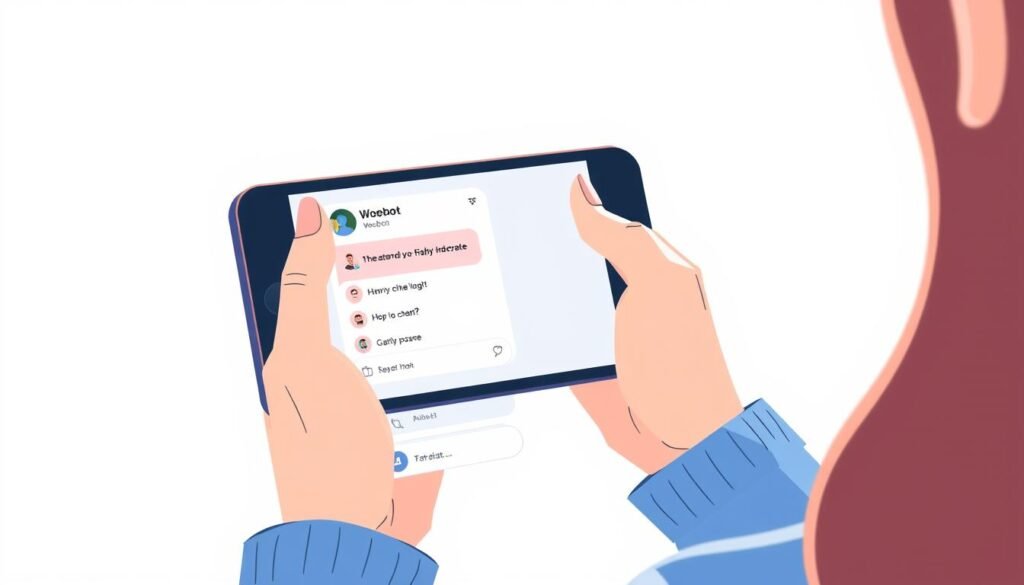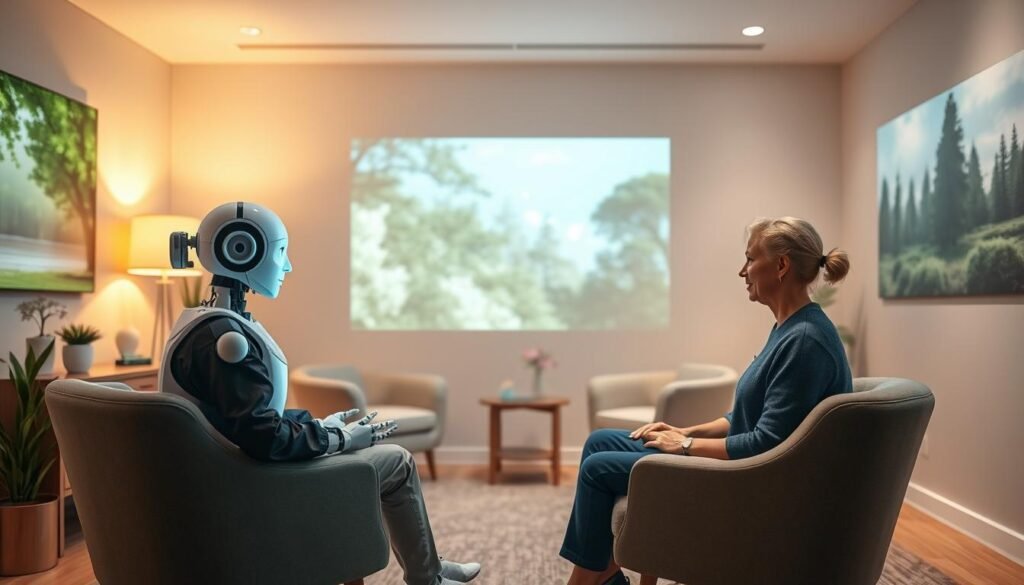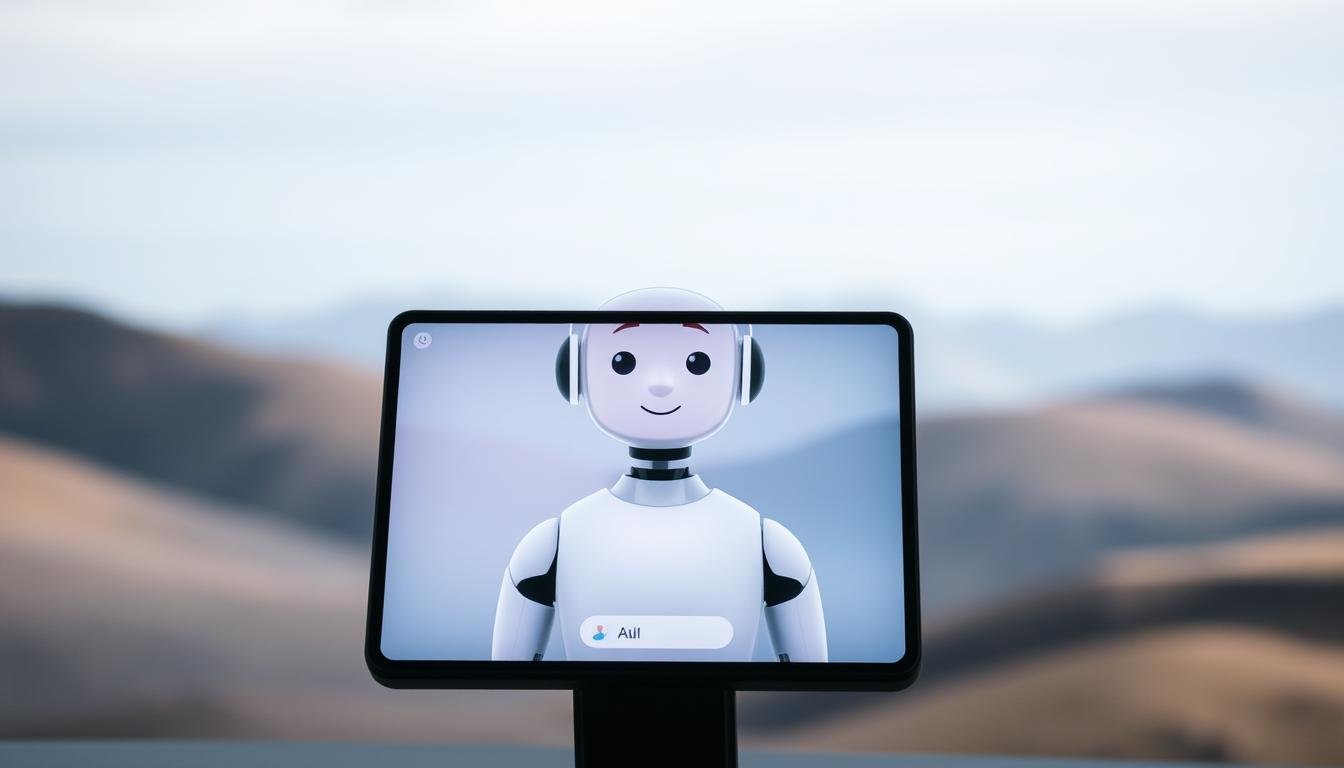AI Therapy Chatbots: Your Digital Mental Health Companion
Mental health support is undergoing a significant transformation with the advent of AI therapy chatbots. These digital companions are designed to provide immediate support and guidance through conversational interfaces on health apps.
The growing global mental health crisis has accelerated the development of these innovative solutions. Users can now interact with chatbots 24/7, receiving responses to their concerns without the barriers of traditional therapy. This guide explores the role of these digital tools in the broader health care ecosystem.
Key Takeaways
- AI therapy chatbots offer accessible mental health support through conversational interfaces.
- These digital tools provide immediate responses and guidance 24/7.
- The growing mental health crisis has driven the adoption of AI-powered solutions.
- Users can interact with chatbots through health apps on their smartphones.
- AI therapy chatbots represent a revolutionary approach to mental health care.
Understanding AI Therapy Chatbots
With the global shortage of therapists, AI-powered chatbots are stepping in to fill the gap. These digital companions are designed to provide mental health support, offering a blend of technology and therapeutic techniques to address the growing need for accessible mental health care.
What Are AI Therapy Chatbots?
AI therapy chatbots are sophisticated software programs that utilize natural language processing (NLP) and machine learning algorithms to simulate therapeutic conversations. They are designed to engage users in meaningful interactions, providing support and guidance on mental health issues. These chatbots are not meant to replace human therapists but rather to offer an additional layer of support, making mental health care more accessible and affordable.
The functionality of AI therapy chatbots can vary widely, from simple mood tracking and meditation guides to more complex cognitive behavioral therapy (CBT) techniques. Some chatbots are designed to identify early signs of mental health issues, while others focus on providing coping strategies and stress management techniques.
| Feature | Description | Benefit |
|---|---|---|
| NLP Capabilities | Understanding user input and context | Personalized interactions |
| Therapeutic Techniques | CBT, mindfulness, and stress management | Effective mental health support |
| Accessibility | 24/7 availability, anonymous support | Increased accessibility to mental health care |
The Evolution of Digital Mental Health Support
Digital mental health support has undergone significant evolution, transforming from simple self-help apps to sophisticated AI-powered chatbots. The first generation of mental health apps primarily offered static content, such as meditation guides and mood tracking. However, with advancements in technology, today’s AI chatbots provide dynamic, personalized interactions that can engage in meaningful therapeutic conversations.
“The COVID-19 pandemic accelerated the adoption of digital mental health tools as demand for support surged while in-person services became less accessible.” This shift has highlighted the importance of technology in bridging the gap in mental health care.
The evolution of these tools represents a shift toward more accessible, scalable mental health support solutions that can reach populations traditionally underserved by conventional therapy. Technological advancements in NLP have dramatically improved the ability of chatbots to understand context, emotions, and nuanced language, making them more effective in providing support.
As digital mental health support continues to evolve, it’s essential to consider the role of AI therapy chatbots in the broader landscape of mental health care. By understanding their capabilities and limitations, we can better harness their potential to support mental health.
The Growing Need for Mental Health Support
The demand for mental health support is escalating globally, highlighting the need for innovative solutions. As mental health awareness continues to grow, it becomes increasingly clear that traditional methods of providing mental health care are facing significant challenges in meeting the rising demand.
The global landscape of mental health is complex, with various factors contributing to the growing need for effective support systems. To understand the scope of the issue, let’s examine the current state of mental health care and the obstacles that prevent people from accessing the treatment they need.
The Global Mental Health Crisis
The world is facing a significant mental health crisis, affecting millions of people worldwide. The World Health Organization has highlighted the gravity of this issue, emphasizing the need for comprehensive mental health care strategies. In the United States, the situation is particularly dire, with a shortage of mental health professionals and resources.
Barriers to Traditional Therapy Access
Several barriers hinder access to traditional therapy, making it difficult for individuals to receive the care they need. Some of the key challenges include:
- High costs associated with therapy sessions, often ranging from $100 to $200 per hour without insurance coverage.
- Geographic limitations that create “therapy deserts,” where qualified mental health professionals are scarce.
- Long waiting lists that delay treatment, potentially worsening mental health conditions.
- Stigma surrounding mental health issues, discouraging people from seeking help.
- Time constraints that make regular therapy appointments challenging for working individuals, parents, and caregivers.
As illustrated by the challenges faced in accessing traditional therapy, there is a clear need for alternative solutions. A quote from Jackson encapsulates the issue: “We don’t have enough providers for that many people… For some people, that knocks them out of therapy completely.” This highlights the necessity for innovative approaches to mental health support.
| Barrier | Description | Impact |
|---|---|---|
| Cost | High session costs without insurance | Limits affordability |
| Geographic Limitations | Scarcity of professionals in certain areas | Creates “therapy deserts” |
| Waiting Lists | Long delays for mental health services | Delays treatment, worsens conditions |
How AI Therapy Chatbots Work
Understanding how AI therapy chatbots work is crucial for appreciating their role in modern mental health care. These digital companions are designed to support individuals dealing with various mental health issues, including mild depression, loneliness, and anxiety.
AI therapy chatbots respond to user inputs in a manner that simulates human therapy sessions. They ask questions, suggest coping mechanisms, set goals, and offer to hold users accountable for their progress. Some advanced chatbots even track, analyze, and monitor a user’s mood over time, mimicking certain aspects of human therapist interactions.
Rules-Based vs. Generative AI Systems
AI therapy chatbots can be broadly categorized into two types based on their underlying AI systems: rules-based and generative AI systems.
| Characteristics | Rules-Based Systems | Generative AI Systems |
|---|---|---|
| Response Generation | Predefined rules and scripts | Dynamic, based on complex algorithms and machine learning |
| Personalization | Limited personalization based on user input | Highly personalized interactions |
| Complexity | Less complex, easier to develop and maintain | More complex, requiring significant data and computational resources |
Rules-based systems are simpler and rely on pre-defined rules to generate responses. In contrast, generative AI systems use complex algorithms and machine learning to create more dynamic and personalized interactions.
Therapeutic Approaches Used by AI Chatbots
AI therapy chatbots employ various therapeutic approaches to support mental health. Cognitive Behavioral Therapy (CBT) is a foundational element for most chatbots, helping users identify and change negative thought patterns.
- Mindfulness techniques are incorporated to guide users through exercises and meditation, reducing stress and anxiety.
- Some advanced chatbots utilize Dialectical Behavior Therapy (DBT) principles to help users regulate emotions and improve interpersonal skills.
- Motivational interviewing techniques are used to support users in exploring and resolving ambivalence about behavioral changes.
These therapeutic approaches are implemented through structured conversations, exercises, and regular check-ins, encouraging consistent engagement with mental health practices. By leveraging these techniques, AI therapy chatbots provide users with effective tools for managing their mental health.
The Science Behind AI Therapy
The integration of artificial intelligence in therapy has revolutionized mental health support. AI therapy chatbots are designed to provide effective mental health interventions, leveraging advanced technologies to understand and respond to user needs.
Cognitive Behavioral Therapy (CBT) in AI Applications
Cognitive Behavioral Therapy (CBT) is a widely used therapeutic approach that has been successfully integrated into AI applications. AI chatbots utilize CBT principles to help users identify and challenge negative thought patterns, promoting healthier mental habits. By processing user inputs through natural language understanding, these chatbots can identify emotions and concerns, providing appropriate responses.
The effectiveness of CBT in AI chatbots lies in their ability to maintain conversations that are both coherent and meaningful. This is achieved through advanced Natural Language Processing (NLP) capabilities, enabling chatbots to understand and interpret human language.
- CBT-based chatbots offer structured therapeutic interactions.
- They help users manage anxiety, depression, and other mental health issues.
- These chatbots can be particularly effective for individuals who prefer structured therapy.
Natural Language Processing in Mental Health Support
NLP plays a crucial role in enabling AI therapy chatbots to understand and interpret human language. By analyzing text inputs, NLP algorithms can detect signs of distress, anxiety, or depression, allowing chatbots to provide appropriate support. Advanced sentiment analysis and machine learning techniques enhance the chatbot’s ability to comprehend emotions and respond effectively.
The use of NLP in mental health support has several benefits, including improved accessibility and personalized interactions. As NLP technology continues to evolve, we can expect AI therapy chatbots to become even more effective in supporting mental health.
“The future of mental health support lies in the integration of technology and therapeutic expertise.”
Benefits of AI Therapy Chatbots
AI-powered chatbots are transforming the landscape of mental health support with their unique benefits. These digital companions are designed to provide support and guidance, leveraging AI to enhance user experience and therapeutic outcomes.
24/7 Accessibility and Immediate Support
One of the significant advantages of AI therapy chatbots is their ability to provide 24/7 accessibility and immediate support. Users can interact with these chatbots at any time, receiving instant responses to their queries and concerns. This around-the-clock availability ensures that individuals can access mental health support whenever they need it, without being limited by traditional therapy session schedules.
Affordability and Removing Financial Barriers
AI therapy chatbots also offer affordability and help remove financial barriers to mental health care. Many of these chatbots are available through mobile apps, making them more accessible and often more affordable than traditional therapy sessions. By reducing the cost associated with mental health support, AI chatbots can reach a broader audience and provide essential services to those who might otherwise be unable to afford them.
Anonymity and Reduced Stigma
The anonymity provided by AI therapy chatbots can significantly reduce the stigma associated with seeking mental health support. Users can interact with chatbots without fear of judgment, sharing their concerns and feelings more openly. This anonymity can be particularly beneficial for individuals who are hesitant to seek traditional therapy due to privacy concerns or societal stigma.
Consistency and Personalization
AI therapy chatbots deliver consistent therapeutic approaches, gathering data about user preferences and response patterns to create increasingly personalized experiences over time. The adaptive nature of AI allows these chatbots to tailor their communication style, therapeutic techniques, and recommendations to individual user needs. This combination of consistency and personalization creates a reliable therapeutic relationship, fostering ongoing engagement with mental health practices.
- AI therapy chatbots provide consistent therapeutic approaches without variability.
- These tools gather data to create personalized experiences for users.
- The adaptive nature of AI tailors communication styles to individual needs.
- Consistency reinforces therapeutic concepts through regular interactions.
Limitations and Challenges of AI Mental Health Support
AI mental health support systems, though promising, face several hurdles in their development and implementation. As these systems become more prevalent, understanding their limitations is crucial for ensuring they provide effective support.
Lack of Human Connection and Empathy
One significant limitation of AI therapy chatbots is their inability to fully replicate human connection and empathy. While they can offer immediate responses and support, they lack the emotional depth and understanding that a human therapist can provide. This can be particularly concerning for users who require more nuanced emotional support.
Inability to Handle Crisis Situations
AI mental health support systems are not equipped to handle crisis situations effectively. They cannot replace human judgment in critical situations, such as assessing suicidal ideation or severe mental health crises. Users in acute distress may be directed to human support services, but the chatbot itself cannot intervene appropriately.

Privacy and Data Security Concerns
Concerns regarding privacy and data security are paramount when using AI therapy apps. Most chatbots are categorized as “wellness” tools rather than healthcare services, meaning they don’t adhere to stringent regulations like HIPAA. This regulatory gap raises significant concerns about how user data is handled and protected.
Regulatory and Ethical Challenges
The regulatory landscape for AI therapy chatbots remains underdeveloped. Most apps are classified as “wellness tools” rather than medical devices, creating potential risks for users who may not understand the difference between clinically validated treatments and unregulated digital tools. Ethical questions about informed consent are particularly relevant, as users may not fully comprehend the limitations of AI therapy. Balancing innovation with safety remains a central challenge in the development and deployment of mental health care solutions.
Addressing these challenges is crucial for the future of AI in health care. By understanding and mitigating these limitations, we can work towards creating more effective and safe AI mental health support systems.
Top AI Therapy Chatbots in 2024
In 2024, the demand for accessible mental health solutions has given rise to innovative AI therapy chatbots. These digital companions are designed to provide support, guidance, and therapy to individuals navigating various mental health challenges.
Woebot: The CBT-Focused Companion

Woebot is a pioneering AI therapy chatbot that utilizes Cognitive Behavioral Therapy (CBT) principles to support users. It offers a structured program that helps individuals manage their mental health through interactive tools and exercises.
Wysa: Mindfulness and Mental Wellness

Wysa is an AI-powered mental wellness companion that focuses on mindfulness and stress management. It provides users with guided meditations, breathing exercises, and motivational quotes to enhance their mental wellbeing.
Youper: Personalized Mental Health Support

Youper offers personalized mental health support through its AI-driven chatbot. It uses a combination of CBT and mindfulness techniques to help users cope with anxiety, depression, and other mental health issues.
Earkick: Anonymous Emotional Health Tracking

Earkick provides an anonymous and confidential platform for emotional health tracking. It allows users to monitor their emotions and receive support without revealing their identity.
Elomia: Mindfulness and Coping Techniques

Elomia specializes in mindfulness-based interventions and coping strategies for managing anxiety, depression, and stress. A 2021 peer-reviewed study found significant reductions in symptoms of depression and anxiety among regular users.
These AI therapy chatbots represent the forefront of digital mental health support, offering a range of tools and techniques to help users manage their mental wellbeing. As the field continues to evolve, we can expect even more innovative solutions to emerge.
Research and Effectiveness of AI Therapy
The integration of AI in therapy has sparked a wave of research into its effectiveness and user satisfaction. As AI technology continues to evolve, understanding its impact on mental health support is crucial.
Clinical Studies and Their Findings
Numerous studies have investigated the effectiveness of AI therapy chatbots. For instance, a significant study involving 1,200 users of the Wysa chatbot found that a “therapeutic alliance” between the bot and user developed within just five days. This rapid formation of trust led to increased feelings of honesty, safety, and comfort among the participants.
Research has shown that AI chatbots can provide immediate support and guidance, leveraging mental health strategies such as Cognitive Behavioral Therapy (CBT). The health benefits reported by users include improved mood and better stress management.
- A study on AI therapy chatbots revealed positive outcomes in users who engaged with the technology over time.
- The development of a therapeutic relationship between the chatbot and participants was a significant finding in several studies.
User Satisfaction and Reported Outcomes
User satisfaction with AI therapy chatbots is generally high, with many participants reporting positive experiences. The anonymity and non-judgmental nature of AI interactions contribute to this satisfaction, as users feel more comfortable expressing their thoughts and feelings.
A key aspect of the research highlights the long-term engagement of users with AI chatbots, indicating ongoing perceived value. Self-reported outcomes often include enhanced self-awareness and the development of new coping skills.
“The non-judgmental nature of AI interactions allows users to express thoughts and feelings they might withhold from human therapists,” as noted in qualitative research on user experiences with AI therapy chatbots.
AI Chatbots vs. Human Therapists
Understanding the differences between AI chatbots and human therapists is crucial for determining the best approach to mental health support. As mental health concerns continue to rise, the role of technology in providing support has become a significant topic of discussion.
Comparing Approaches and Outcomes
AI chatbots and human therapists differ significantly in their approaches to mental health support. AI chatbots are programmed to offer immediate responses and support based on algorithms and data analysis. They are particularly effective for mild to moderate mental health concerns such as everyday stress, mild anxiety, or situational depression. On the other hand, human therapists provide a more personalized and empathetic approach, which is essential for complex or severe mental health conditions.
According to Sinha, a trained psychologist, AI chatbots are not equipped to handle severe conditions like schizophrenia or eating disorders due to their complexity and the need for in-person interaction and medication. Human therapists are indispensable in such cases, offering the nuanced understanding and intervention required.
| Characteristics | AI Chatbots | Human Therapists |
|---|---|---|
| Approach | Algorithm-based, immediate response | Personalized, empathetic |
| Suitable Conditions | Mild to moderate mental health concerns | Complex or severe mental health conditions |
| Interaction | Text-based, limited emotional depth | In-person, nuanced emotional understanding |
When to Choose Each Option
The choice between AI chatbots and human therapists depends on the individual’s mental health needs. For people experiencing mild mental health issues, AI chatbots can be an effective and accessible solution. However, for those with severe or complex conditions, human therapists are the better choice.
A hybrid model, combining the benefits of both AI chatbots and human therapists, may offer the most comprehensive support for many users. AI chatbots can serve as supplementary tools between therapy sessions, providing continuous support and reinforcing skills learned during therapy.
In conclusion, both AI chatbots and human therapists have their unique strengths and limitations. By understanding these differences, individuals can make informed decisions about their mental health support.
AI Therapy Chatbots as Complementary Tools
As mental health support continues to evolve, AI therapy chatbots are emerging as important adjuncts to traditional therapy. According to Jessica Jackson, a licensed psychologist based in Texas, “It’s a way to have continuity, especially if the therapist also has access and can see the times that you’re talking to it and what the conversations are.” This continuity is crucial in providing comprehensive care to users.
AI therapy chatbots can support traditional therapy in several ways. They offer a means to maintain therapeutic momentum between sessions, providing users with consistent support and guidance.
Supporting Traditional Therapy
AI chatbots can be used as a supplementary tool to traditional therapy, enhancing the overall therapeutic experience. By providing users with additional support between sessions, chatbots help bridge the gap in care that often exists in the traditional weekly therapy model. This continuous support enables users to practice coping skills and mindfulness techniques consistently, leading to better mental health outcomes.
The benefits of using AI chatbots as complementary tools include:
- Providing valuable support during the days or weeks between therapy sessions
- Encouraging consistent practice of coping skills and mindfulness techniques
- Offering immediate coping strategies for users experiencing heightened distress
- Helping therapists gain insights into user challenges through chatbot interaction data
Bridging Gaps Between Sessions
The continuous nature of chatbot support helps maintain the therapeutic momentum, ensuring that users remain engaged and motivated throughout their treatment. By leveraging AI chatbots, therapists can gain a more comprehensive understanding of their patients’ needs, allowing for more targeted interventions during in-person sessions.

By integrating AI therapy chatbots with traditional therapy methods, mental health professionals can provide a more holistic and supportive care environment. This integrated approach has the potential to enhance treatment outcomes and improve overall user satisfaction.
When AI Therapy Is Not Appropriate
AI therapy chatbots have limitations, particularly in crisis situations that demand immediate human intervention. While these digital tools offer significant support for mental health, there are critical situations where they are not suitable.
Serious Mental Health Conditions
AI chatbots are not designed to handle serious mental health conditions that require complex diagnoses or nuanced treatment plans. Conditions such as severe depression, bipolar disorder, or schizophrenia necessitate human professional judgment and intervention. AI systems lack the capability to fully understand the complexity of these conditions or provide the depth of support required.
The table below highlights key differences between AI chatbots and human professionals in handling serious mental health conditions:
| Aspect | AI Chatbots | Human Professionals |
|---|---|---|
| Complexity of Diagnosis | Limited to programmed algorithms | Can assess nuanced symptoms and history |
| Treatment Personalization | Based on predefined protocols | Tailored to individual needs and responses |
| Emotional Support | Simulated empathy | Provides genuine emotional understanding and connection |
Crisis Intervention and Suicidal Ideation
Crisis situations, including suicidal ideation or intent, require immediate and human intervention. AI chatbots are fundamentally unsuitable for crisis intervention as they cannot accurately assess risk levels or provide the necessary judgment and intervention capabilities.
Many mental health chatbots are designed to detect crisis keywords and redirect users to appropriate resources. However, they often miss subtle indicators of suicidal thinking, making them unreliable as primary supports during mental health emergencies.
Users experiencing suicidal thoughts or psychiatric emergencies should be directed to immediate human support through crisis hotlines, emergency services, or emergency departments. It’s crucial for users to understand the limitations of AI chatbots in these situations.
Privacy and Data Security in AI Therapy
The rise of AI therapy chatbots has sparked a crucial conversation about the handling of sensitive user information. As these digital mental health companions become increasingly popular, concerns about privacy and data security have come to the forefront.
In conventional therapy, clinicians are held to a very high standard of care, bound by confidentiality laws that protect patient information. However, AI therapy chatbots operate under different regulations. Most of them are categorized as “wellness tools” rather than healthcare services, meaning they don’t have to adhere to the same laws, such as HIPAA, which protects the privacy of patients’ medical records and other personal data.
How User Data is Handled
AI therapy chatbots handle user data in various ways, depending on the service provider and the specific app. While some chatbots may store user interactions to improve their services, others may share information with third parties for various purposes, including marketing. The lack of transparency in data handling practices can erode user trust.
According to recent observations, “Most AI therapy chatbots are not required to comply with HIPAA regulations that protect patient health information.” This regulatory gap exists because many mental health apps are classified as “wellness tools” rather than medical devices, exempting them from stricter healthcare privacy laws.
HIPAA Compliance and Regulatory Standards
The regulatory landscape for AI therapy chatbots is complex and varies significantly across different regions. In the United States, HIPAA sets a standard for protecting sensitive patient data. However, not all mental health apps are required to comply with HIPAA. Some premium chatbot services voluntarily adhere to HIPAA standards as a competitive advantage and to build user trust.
International users face additional complexity as data protection regulations vary significantly across countries. For instance, the General Data Protection Regulation (GDPR) in Europe provides stronger protections than many other regions. The lack of consistent regulatory standards creates significant disparities in how mental health data is protected across different chatbot platforms.
As the use of AI therapy chatbots continues to grow, it is crucial for users to be aware of the privacy and data security implications. Users should carefully review the terms of service and data handling practices of any mental health app before use.
Real-World Applications of AI Therapy Chatbots
From Kenya to Syria, AI therapy chatbots are making a significant impact. AI chat therapists have been rolled out in various settings, from a maternity hospital in Kenya to refugee camps in Syria. In the United States, some apps have even been recognized by the Food and Drug Administration (FDA) and are being clinically tested. This global deployment underscores the versatility and potential of AI therapy chatbots in addressing mental health needs across different populations.
AI Support in Healthcare Systems
AI therapy chatbots are being integrated into healthcare systems to provide support to patients. For instance, these chatbots can offer immediate assistance and basic counseling, helping to bridge the gap between patients’ needs and the availability of mental health professionals. In regions with severe shortages of mental health professionals, AI chatbots are deployed to provide essential support.
A notable example is the use of chatbots in refugee camps and humanitarian crisis settings, where they offer scalable mental health support for trauma, anxiety, and depression. These chatbots are particularly valuable in situations where professional resources are extremely limited.
| Region | Application | Benefit |
|---|---|---|
| Kenya | Maternity Hospital | Providing mental health support to new mothers |
| Syria | Refugee Camps | Offering support for trauma, anxiety, and depression |
| United States | Clinical Testing | FDA-recognized apps for mental health support |
Use in Underserved Communities and Global Settings
AI therapy chatbots are also being utilized in underserved communities and global settings to overcome barriers to mental health care. Rural communities in the United States and globally benefit from chatbot access that overcomes geographic barriers to mental health care. Low and middle-income countries are implementing chatbot solutions to address the enormous gap between mental health needs and available professional resources.
“The use of AI chatbots in mental health care represents a significant step forward in making support more accessible and reducing the stigma associated with seeking help.”
Cultural adaptations of therapy chatbots are being developed to provide more contextually appropriate support across diverse global communities. This tailored approach ensures that the support provided is relevant and effective for different populations.

Building Trust with AI Mental Health Support
The success of AI therapy chatbots hinges on establishing trust with their users. As these digital mental health companions become more prevalent, understanding the dynamics of trust in this context is crucial.
Trust in AI mental health support is multifaceted, involving factors such as the chatbot’s ability to provide helpful responses, its reliability, and the transparency of its capabilities and limitations.
Creating a Therapeutic Alliance with AI
Creating a therapeutic alliance with AI involves designing chatbots that can engage users in a manner that feels supportive and non-judgmental. According to Chaitali Sinha, senior VP of healthcare and clinical development at AI therapy app Wysa, “These chatbots can actually talk to you, and help you work through the thoughts that you’re having.” This capability can foster a sense of connection and trust between the user and the chatbot.
A key aspect of this alliance is the chatbot’s ability to provide consistent and personalized support. By using advanced algorithms to understand user inputs and respond appropriately, AI chatbots can create a sense of being understood and supported.
Setting Realistic Expectations for Users
Setting realistic expectations about what AI therapy chatbots can and cannot provide is essential for building appropriate user trust and preventing disappointment. Users should understand that chatbots serve as supportive tools rather than replacements for professional mental health care, particularly for complex conditions.
- Clear communication about a chatbot’s capabilities, limitations, and appropriate use cases helps users engage with the technology in beneficial ways.
- Transparent disclosure about how AI works, including its inability to truly “understand” emotions, helps users form appropriate relationships with these tools.
- Managing expectations includes helping users recognize when they should transition from AI support to human professional care for more serious concerns.
| Expectation | Reality |
|---|---|
| AI chatbots can replace human therapists. | AI chatbots are supportive tools, not replacements for professional care. |
| AI chatbots can diagnose mental health conditions. | AI chatbots are not qualified to make diagnoses or prescribe medication. |
| AI chatbots fully understand user emotions. | AI chatbots simulate understanding through algorithms, but don’t truly comprehend emotions. |
By setting realistic expectations and fostering a therapeutic alliance, AI therapy chatbots can become a valuable resource for mental health support, enhancing user trust and overall effectiveness.
The Future of AI in Mental Health Care
AI is poised to revolutionize mental health care through innovative technologies and improved healthcare system integration. The ideal approach for many people may be a hybrid model where AI chatbots complement regular sessions with human therapists, providing continuous support while maintaining professional oversight.
This hybrid model is expected to become more prevalent as healthcare systems evolve to incorporate AI therapy chatbots as standard components of mental health treatment pathways. This integration will create a seamless experience between digital and human care, enhancing the overall quality of support provided to patients.
Emerging Technologies and Innovations
Several emerging technologies are set to further enhance the capabilities of AI in mental health care. For instance, advancements in natural language processing will allow chatbots to better understand and respond to user inputs. Additionally, the integration of electronic health records will enable chatbots to incorporate relevant medical history and treatment plans, sharing appropriate data with healthcare providers.
Stepped care models are also expected to evolve, utilizing AI as initial support with clear pathways to human intervention when needed. This approach will optimize the use of limited clinical resources, ensuring that patients receive the appropriate level of care.
- Future healthcare systems will incorporate AI therapy chatbots, creating seamless integration between digital and human care.
- Electronic health record integration will allow chatbots to incorporate relevant medical history and treatment plans.
- Insurance companies in the United States are increasingly recognizing the value of AI mental health support.
Integration with Healthcare Systems
The integration of AI chatbots with healthcare systems will be crucial for their success. This integration will involve not only the technical aspect of incorporating chatbots into existing systems but also developing protocols for determining which patients are appropriate candidates for AI-supported care versus traditional therapy.
As AI continues to play a larger role in mental health care, it is likely that therapists will work alongside AI systems to provide comprehensive care. This collaboration will enable a more efficient use of resources and improve patient outcomes.
The future of AI in mental health care is promising, with potential advancements in technology and integration with healthcare systems paving the way for more effective and accessible care.
Conclusion: Balancing Technology and Human Connection in Mental Health
With the rise of digital mental health tools, AI therapy chatbots are emerging as a vital resource for those seeking accessible and affordable care. These AI therapy chatbots represent a promising advancement in mental health support, offering unprecedented accessibility, affordability, and convenience for millions of people.
The technology serves as a valuable complement to traditional therapy rather than a replacement, addressing gaps in care while acknowledging the irreplaceable value of human connection. As Brent Franson, founder and CEO at wellness app Most Days, noted, “Until we have really strong data that an experience with AI is as good or better than traditional therapy, I think we need to be very careful about recommending it as an alternative.” This cautious approach highlights the importance of balancing technological innovation with the human therapists who provide empathy and understanding.
The future of mental health care likely lies in thoughtfully integrated approaches that leverage both AI efficiency and human empathy to create comprehensive support systems. As these technologies continue to evolve, maintaining ethical standards, privacy protections, and appropriate boundaries will be essential to ensuring they benefit rather than harm users. The ultimate goal remains improving health outcomes and expanding access to care for people, with AI serving as one important tool in a broader ecosystem of care options tailored to individual needs.
In conclusion, AI therapy chatbots are paving a new way for mental health support, one that complements traditional methods while expanding reach and accessibility. By embracing this technology and integrating it thoughtfully into existing care structures, we can create a more inclusive and effective support system for those in need.
FAQ
Are AI mental health support tools a replacement for human therapists?
No, AI therapy chatbots are designed to be complementary tools, not replacements for human therapists. They can provide support and guidance, but they lack the empathy and human connection that a therapist can offer.
How do AI chatbots handle crisis situations or suicidal ideation?
Most mental health apps and AI chatbots are not equipped to handle crisis situations. They usually provide resources and emergency contact information for users in crisis, such as the National Suicide Prevention Lifeline.
Is my data secure when using AI therapy chatbots?
Reputable health apps and AI chatbots prioritize user data security and comply with regulations like HIPAA. They use encryption and secure servers to protect user information.
Can AI therapy chatbots diagnose mental health disorders?
No, AI chatbots are not capable of diagnosing mental health disorders. They can, however, provide information and support, and may suggest seeking professional help if needed.
How effective are AI therapy chatbots in managing depression and anxiety?
Research has shown that cognitive behavioral therapy (CBT)-based AI chatbots can be effective in reducing symptoms of depression and anxiety in some users.
Can I use AI therapy chatbots alongside traditional therapy?
Yes, many people use AI mental health support tools in conjunction with traditional therapy. These tools can help bridge gaps between sessions and provide additional support.
Are AI therapy chatbots available 24/7?
Yes, most AI chatbots are available 24/7, providing users with immediate support and guidance whenever they need it.
How do AI chatbots personalize their support for users?
AI chatbots use natural language processing and machine learning algorithms to understand user input and tailor their responses to individual needs and preferences.
Share this content:




Post Comment